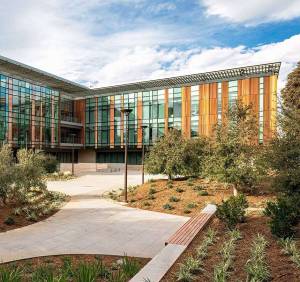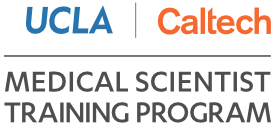The UCLA MSTP requires completion of at least two research rotations before selection of a PhD thesis laboratory or research mentor for those in the Social Science Track. Students are required to do a research rotation during the summer preceding the first year of medical school, which also serves to introduce students to the research faculty on campus prior to the start of medical school. Students also complete a research rotation during their MD2 year. If necessary, the MSTP also supports an additional research rotation after the second year of medical school to ensure students find an appropriate research mentor. The structure of the MD1 curriculum is ideal for MSTP students as it provides significant unscheduled time that allows students the flexibility to participate in lab meetings, journal clubs, or actively engage in research during their first year in the program.
The number of research opportunities at UCLA and Caltech is extraordinary. Upon acceptance into the program, students are assigned to one of the program co-directors or associate directors, who serve as the primary program mentor. Students and their program mentors meet multiple times each year to help identify faculty and research labs in the student’s area of interest, offer guidance during their PhD thesis, and facilitate smooth transitions between MD and PhD phases of training. Additional mentorship is provided to Caltech students by our MSTP Associate Director at Caltech and to students in our Social Sciences Track by our MSTP Associate Director for Social Sciences.
The following websites are a few of the many useful resources for learning about faculty research interests.
At UCLA:
UCLA Graduate Program in Biosciences (GPB)
The GPB is a consortium of eleven Home Areas, each consisting of an interdepartmental group of faculty and students with shared interests in research areas and approaches. Each interdepartmental Home Area is aligned with a Ph.D.-granting program, provides in-depth, cutting-edge training, and offers access to a wide variety of exceptional faculty mentors. Home Areas break down conventional institutional divisions and serve as a nexus for inquiry, training, and discovery in research themes where UCLA faculty members are leaders.
UCLA Center for Social Medicine and Humanities
The UCLA Center for Social Medicine is a community of scholars bringing insights from the social sciences and humanities to bear on the urgent challenges of health, disease and scientific and clinical practice, with a commitment to social justice. It serves as the foundation for students in the MSTP Social Sciences Track.
UCLA Samueli School of Engineering
The UCLA Samueli is at the forefront of technological innovation, at one of the most respected research universities in the world. Under the guidance of a distinguished faculty member, students are able to pursue PhD in a number of graduate programs, including bioengineering, chemical and biochemical engineering, computer science, and computational medicine, to name a few.
MSTP students may also pursue PhD training through additional individual degree-granting programs at UCLA. We encourage you to contact the MSTP program directors and specific degree granting programs to explore these possibilities.
At Caltech:
 Division of Biology and Biological Engineering (BBE)
Division of Biology and Biological Engineering (BBE)
BBE focuses on advancing investigations of and expanding knowledge about the nature of life- from a single molecule to an entire organism. Through interdisciplinary programs of study and research, faculty and students address complex questions related to how living things evolve, develop, and function, and then use their findings to engineer innovative biological systems as well as medicines and other therapies.
Division of Chemistry and Chemical Engineering (CCE)
Faculty in CCE work at the forefront of their fields to advance knowledge in the areas of chemistry, chemical engineering, and biochemistry and molecular biophysics.
Division of Engineering and Applied Science (EAS)
EAS at Caltech is a collaborative community working at the leading edges of fundamental science to invent the technologies of the future.

